
The Federated States of Micronesia are located on the Caroline Islands in the western Pacific Ocean. The history of the modern Federated States of Micronesia is one of settlement by Micronesians; colonization by Spain, Germany, and Japan; United Nations trusteeship under United States-administered Trust Territory of the Pacific Islands; and gradual independence beginning with the ratification of a sovereign constitution in 1979.
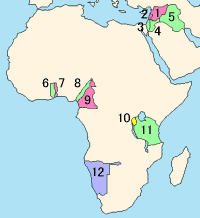
A League of Nations mandate represented a legal status under international law for specific territories following World War I, involving the transfer of control from one nation to another. These mandates served as legal documents establishing the internationally agreed terms for administering the territory on behalf of the League of Nations. Combining elements of both a treaty and a constitution, these mandates contained minority rights clauses that provided for the rights of petition and adjudication by the Permanent Court of International Justice.
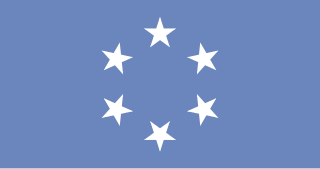
The Trust Territory of the Pacific Islands (TTPI) was a United Nations trust territory in Micronesia administered by the United States from 1947 to 1994. The Imperial Japanese South Seas Mandate had been seized by the US during the Pacific War, as Japan had administered the territory since the League of Nations gave Japan a mandate over the area from Imperial Germany after World War I. However, in the 1930s, Japan left the League of Nations and invaded additional lands. During World War II, military control of the islands was disputed, but by the war's end, the islands had come under the Allies' control. The Trust Territory of the Pacific was created to administer the islands as part of the United States while still under the auspices of the United Nations. Most of the island groups in the territory became independent states, with some degree of ties kept with the United States: the Federated States of Micronesia, Marshall Islands and Palau are today independent states in a Compact of Free Association with the US, while the Northern Mariana Islands remain under US jurisdiction, as an unincorporated territory and commonwealth.

The United Nations Trusteeship Council is one of the six principal organs of the United Nations, established to help ensure that trust territories were administered in the best interests of their inhabitants and of international peace and security.

The United Nations trust territories were the successors of the remaining League of Nations mandates, and came into being when the League of Nations ceased to exist in 1946. All the trust territories were administered through the United Nations Trusteeship Council and authorized to a single country. The concept is distinct from a territory temporarily and directly governed by the United Nations.

The United Nations Truce Supervision Organization (UNTSO) is an organization founded on 29 May 1948 for peacekeeping in the Middle East. Established amidst the 1948 Arab–Israeli War, its primary task was initially to provide the military command structure to the peacekeeping forces in the Middle East to enable the peacekeepers to observe and maintain the ceasefire, and in assisting the parties to the Armistice Agreements in the supervision of the application and observance of the terms of those Agreements. The organization's structure and role has evolved over time as a result of the various conflicts in the region and at times UNTSO personnel have been used to rapidly deploy to other areas of the Middle East in support of other United Nations operations. The command structure of the UNTSO was maintained to cover the later peacekeeping organisations of the United Nations Disengagement Observer Force (UNDOF) and the United Nations Interim Force in Lebanon (UNIFIL) to which UNTSO continues to provide military observers.
A United Nations General Assembly resolution is a decision or declaration voted on by all member states of the United Nations in the General Assembly.
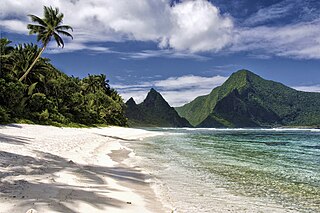
In the law of the United States, an insular area is a U.S.-associated jurisdiction that is not part of a U.S. state or the District of Columbia. This includes fourteen U.S. territories administered under U.S. sovereignty, as well as three sovereign states each with a Compact of Free Association with the United States. The term also may be used to refer to the previous status of the Swan Islands, Hawaii, Guam, Puerto Rico, and the Philippines, as well as the Trust Territory of the Pacific Islands when it existed.
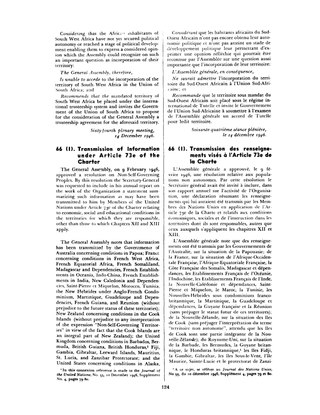
Chapter XI of the United Nations Charter defines a non-self-governing territory (NSGT) as a territory "whose people have not yet attained a full measure of self-government". Chapter XI of the UN Charter also includes a "Declaration on Non-Self-Governing Territories" that the interests of the occupants of dependent territories are paramount and requires member states of the United Nations in control of such territories to submit annual information reports concerning the development of those territories. Since 1946, the UNGA has maintained a list of non-self governing territories under member states' control. Since its inception, dozens of territories have been removed from the list, typically when they attained independence or internal self-government, while other territories have been added as new administering countries joined the United Nations or the UN General Assembly (UNGA) reassessed their status.

The United Nations Regional Groups are the geopolitical regional groups of member states of the United Nations. Originally, the UN member states were unofficially organized into five groups as an informal means of sharing the distribution of posts for General Assembly committees. Now this grouping has taken on a much more expansive and official role. Many UN bodies are allocated on the basis of geographical representation. Top leadership positions, including Secretary-General and President of the General Assembly, are rotated among the regional groups. The groups also coordinate substantive policy and form common fronts for negotiations and bloc voting.

Corpus separatum was the internationalization proposal for Jerusalem and its surrounding area as part of the United Nations Partition Plan for Palestine. It was adopted by the United Nations General Assembly with a two-thirds majority in November 1947. According to the Partition Plan, the city of Jerusalem would be brought under international governance, conferring it a special status due to its shared importance for the Abrahamic religions. The legal base ("Statute") for this arrangement was to be reviewed after ten years and put to a referendum. The corpus separatum was again one of the main issues of the post-war Lausanne Conference of 1949, besides the borders of Israel and the question of the Palestinian right of return.
The following outline is provided as an overview of and topical guide to the United Nations:

United Nations Administered West New Guinea refers to the period between 1 October 1962 and 1 May 1963 when Western New Guinea was administered by the United Nations Temporary Executive Authority (UNTEA) in accordance with in article two of the New York Agreement reached between the governments of the Netherlands and Indonesia in August 1962.
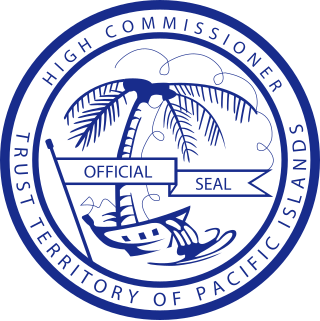
The high commissioner of the Trust Territory of the Pacific Islands was an official who administered the Trust Territory of the Pacific Islands (TTPI), a United Nations trusteeship in the Pacific Ocean under the administration of the United States, between 1947 and 1994. The territory consisted of islands captured by America during World War II, prior to which they had been part of the Empire of Japan as the South Seas Mandate, within the Japanese colonial empire. After World War II, United Nations Security Council Resolution 21 placed the territory under the United States trusteeship as the Trust Territory of the Pacific Islands. The islands are now part of Palau, Northern Mariana Islands, Federated States of Micronesia, and Marshall Islands.

Nauruan nationality law is regulated by the 1968 Constitution of Nauru, as amended; the Naoero Citizenship Act of 2017, and its revisions; custom; and international agreements entered into by the Nauruan government. These laws determine who is, or is eligible to be, a national of Nauru. The legal means to acquire nationality, formal membership in a nation, differ from the domestic relationship of rights and obligations between a national and the nation, known as citizenship. Nauruan nationality is typically obtained either on the principle of jus soli, i.e. by birth in the Nauru or under the rules of jus sanguinis, i.e. by birth to parents with Nauruan nationality. Naturalization is only available to those with some connection to the country, such as the spouse of a citizen; no amount of time living in Nauru will, by itself, make one eligible for naturalization.
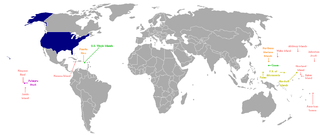
United Nations Security Council resolution 683, adopted on 22 December 1990, after recalling Resolution 21 (1947) which approved the Trusteeship Territory of the Japanese Mandated Islands as well as Chapter XII of the United Nations Charter which established the United Nations Trusteeship system, the council determined that, in the light of entry into force of new status agreements for the Federated States of Micronesia, the Marshall Islands and the Northern Mariana Islands, the objectives of the Trusteeship Agreement had been completed and therefore ended the Trusteeship Agreement with those entities.
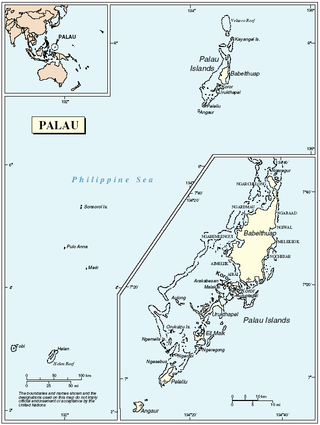
United Nations Security Council resolution 956, adopted unanimously on 10 November 1994, after recalling Chapter XII of the United Nations Charter which established the United Nations Trusteeship system and Resolution 21 (1947) which approved the Trusteeship Territory of the Japanese Mandated Islands, the Council determined that, in the light of entry into force of a new status agreement for the Republic of Palau, the objectives of the Trusteeship Agreement had been completed and therefore ended the status of Palau as a Trust Territory.
The United States Proposal for Temporary United Nations Trusteeship for Palestine, announced by President Harry S. Truman on March 25, 1948, was a revised plan from the United States government for the future of the British Mandate for Palestine. The proposal came four months after the approval in the General Assembly of the United Nations Partition Plan for Palestine which had been vigorously supported by the United States, and represented a major shift in policy in response to the ongoing 1947–1948 Civil War in Mandatory Palestine.

The Congress of Micronesia was a bicameral legislature in Trust Territory of the Pacific Islands from 1964 to 1979.
The Marianas archipelago of the Northern Pacific contains fourteen islands located between Japan and New Guinea on a north–south axis and Hawaii and the Philippines on an east–west axis. Inhabitants were Spanish nationals from the 16th century until the Spanish–American War of 1898. As Guam became a territory of the United States the Northern Marianas were sold to Germany in 1899. The Northern Mariana Islands were a German protectorate until 1919, when they became part of the South Seas Mandate, administered by Japan. At the close of World War II, the Marianas became part of the Trust Territory of the Pacific Islands. In 1975, the Commonwealth of the Northern Mariana Islands became a self-governing territory. In 1986, the Marianas came under the sovereignty of the United States when the trusteeship ended and US nationality and citizenship was conferred on the inhabitants of the territory.















